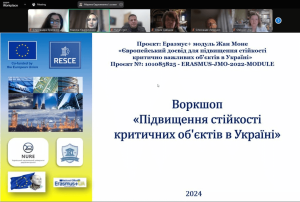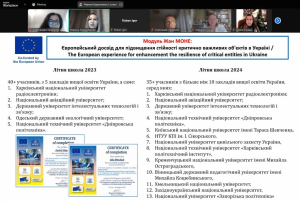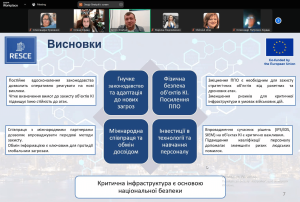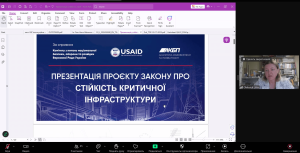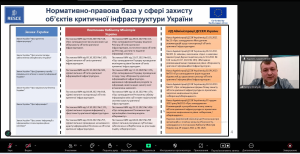31.10.2024
On October 31, 2024, an online workshop organized by the Department of Information and Communication Engineering named after V.V. Popovsky NURE within the framework of the Erasmus+ project Jean Monet module “European experience to increase the sustainability of critical objects in Ukraine”. This event became extremely relevant in view of the growth of cyber threats and challenges faced by Ukraine, and focused attention on the need to improve the security of critical infrastructure according to European standards.
The workshop was opened by acting Ihor Ruban, rector of the Kharkiv National University of Radio Electronics, emphasizing the importance of international cooperation in matters of national security. He emphasized that the experience of European partners and modern approaches to the protection of critical infrastructure are key to strengthening Ukraine’s defense capabilities in the face of new threats.
Project coordinator, professor of the department of information and communication engineering named after V.V. Yevdokymenko M.O. of Popovskogo NURE, spoke about the main activities of the Erasmus+ Jean Monnet Module ResCE project, in particular about the results of summer schools, developed courses, etc., and shared plans for the future to achieve better results regarding the implementation of the project and increase the level of cyber security in Ukraine.
The invited expert, Liliya Oleksyuk, who is a freelance adviser to the Committee of the VRU on National Security, Defense and Intelligence, during her speech reviewed in detail the legal framework of Ukraine in the field of critical infrastructure protection, comparing it with the requirements of EU Directive No. 2022/2557.She emphasized that Ukrainian legislation is currently focused on the protection of critical infrastructure facilities, while the European approach is more focused on ensuring the sustainability of service provision processes. Ms. Lilia also drew attention to the difference in approaches to determining the level of criticality: in Ukraine it is based on the importance of the object, while in the EU it is based on risk assessment. She emphasized the importance of creating a register of critical operators and implementing an effective monitoring system, which is provided for by European standards. In addition, the speaker noted that in order to increase the stability of the infrastructure, it is necessary to strengthen responsibility for violations of security requirements. In general, Lilia Oleksiuk’s speech contributed to a deeper understanding of the differences between Ukrainian and European approaches and outlined prospects for further improvement of legislation in Ukraine.
The President of the NGO “Scientific Cybersecurity Association of Ukraine”, Ph.D., professor of the National Aviation University, Serhii Hnatiuk, spoke in detail about the main threats to the critical infrastructure of Ukraine, in particular, cyber attacks, DDoS attacks and ransomware attacks, which can significantly affect the operation of key facilities. He also emphasized the importance of the physical security of the facilities, noting the need to strengthen the air defense system to protect against drones and missile strikes. At the end, Serhii emphasized the need to implement modern monitoring and protection technologies and the importance of international exchange of information and experience in the fight against cyber threats.Andrii Lelyak, Senior Software Developer at Samsung R&D Institute Ukraine, spoke about international standards for the production and protection of machine-readable travel documents established by ICAO (International Civil Aviation Organization). He focused on the key elements of a document that ensure its security: the Visual Inspection Zone (VIZ), the Machine Readable Zone (MRZ) and the contactless reader chip. Andriy also emphasized the advantages of electronic documents, such as convenience of storage, speed of verification and high level of protection. In the end, the speaker considered the possibilities of various options for saving documents and emphasized the promising direction of the development of electronic documents to increase their universality and security.
We sincerely thank our speakers – Lilia Oleksyuk, Serhiy Hnatyuk and Andriy Lelyak for their expert opinion, in-depth analysis of modern challenges and practical recommendations for increasing the stability of Ukraine’s critical infrastructure.
In total, 50 participants from various universities of Ukraine, private companies and state institutions joined the event. This emphasizes the importance of implementing European standards to increase the safety and stability of Ukraine’s infrastructure.
So let’s not stop and increase Ukraine’s cyber resilience!
There are still many interesting initiatives ahead!

